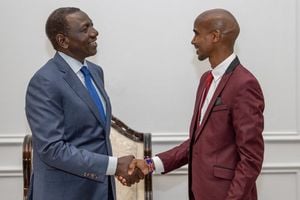30 countries ratify African Court protocol
What you need to know:
- The new President of the Arusha-based court, Justice Slyvain Ore said efforts were being made for more African Union members to be State Parties to the protocol.
- Addressing journalists from more than 25 countries at Mount Meru Hotel in Arusha on Thursday, Mr Ore, from Ivory Coast, vouched for the protection of human rights in the continent.
IN ARUSHA, TANZANIA
Thirty countries have ratified protocol for the establishment of the African Court on Human and Peoples' Rights.
Cameroon is the latest country to ratify the protocol that came into force in January, 2004.
The new President of the Arusha-based court, Justice Slyvain Ore said efforts were being made for more African Union members to be State Parties to the protocol.
Addressing journalists from more than 25 countries at Mount Meru Hotel in Arusha on Thursday, Mr Ore, from Ivory Coast, vouched for the protection of human rights in the continent.
Journalists, the judge said, should be at forefront in denouncing human rights violations.
He further took issue with abuse of human rights on journalists.
The media, he added, should ensure professionalism to "build a better society as freedom of speech has limits."
Mr Justice Ore told editors from central, eastern, western and northern Africa that:" The people of Africa need to be informed about their human rights enshrined in their constitutions and how to achieve these rights."
"This is should never be misconceived as rebellious or counter-productive. In fact, we are ensuring a better future for ourselves, our children and our grandchildren," he added.
GIZ representative to African Court, Ms Karin Pluberg said her organisation will continue supporting the court.
She said journalists from more than 30 countries in Africa have been trained on human rights.

Participants during the African Court on Human and Peoples' Rights training for senior editors and journalists at Mount Meru Hotel in Arusha on September 8, 2016. PHOTO | LUCAS BARASA | NATION MEDIA GROUP
Of the 30 countries that have ratified the protocol, only eight have deposited the declaration required for the Court to have jurisdiction to handle cases from the countries. Rwanda has however asked to withdraw its declaration, a process that could take a year.
Governments in the continent have been on the spot for failure to ratify the protocol that saw the creation of the Court despite establishing it.
Most of cases received by the Court either involve states that have not ratified the protocol or are brought by individuals and NGOs against States that have not deposited the declaration as required by Article 34 (6) of the protocol that would allow individuals and NGOs to bring directly to the Court claims against the states.
The Court is carrying out campaigns to create awareness of its existence, functions, access and what each stakeholder can do to ensure human rights are observed in the continent.
The protocol on African Charter on Human and Peoples’ Rights, to establish the Statute of the African Court on Justice and Human Rights was adopted in Sharm El-Sheikh in Egypt in 2008.
The Court’s mandate has since been extended to try international crimes, such as genocide, crimes against humanity and war crimes.





